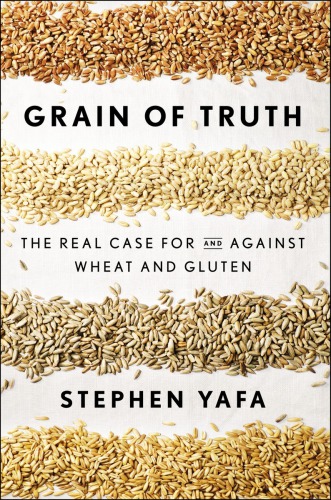
Grain of Truth
Why Eating Wheat Can Improve Your Health
کتاب های مرتبط
- اطلاعات
- نقد و بررسی
- دیدگاه کاربران
نقد و بررسی

March 23, 2015
Journalist Yafa (Cotton: The Biography of a Revolutionary Fiber), declaring himself protected by a “sturdy armor of skepticism,” devotes this informative but unwieldy book to a critique of dietary and nutritional trends—notably, the gluten-free craze—that position wheat as inherently bad for human consumption. In the course of examining the American wheat industry, he achieves a more nuanced position: the technological breakthroughs in grain milling and expedited fermentation have allowed America to prioritize “production of commercial white bread at low cost in massive quantities.” As a result, bread companies have enacted “grave health consequences” on consumers. Gluten is a significant problem for those who have celiac disease, but it has little to do with the other issues around bread consumption. This conclusion is stated early on, while the rest of the book is dedicated to informing the reader about bread. Readers may start to wonder how many scientists, artisanal bakers, and children Yafa must interview before he feels he has sufficiently made his points: bad bread is processed and produced by big companies for mass consumption and capital gain, good bread “comes from wheat grown and nurtured in harmony with nature’s cycles,” and sourdough is cooked slowly and could be suitable for some gluten-intolerant people. Agent: Flip Brophy, Sterling Lord Literistic.

April 15, 2015
Prompted by the growing popularity of gluten-free diets and curious about wheat, author, journalist, and screenwriter Yafa (Cotton: Biography of a Revolutionary Fiber) talked to celiac disease specialists, microbiologists, nutritionists, plant geneticists, bakers, pasta makers, food industry specialists, and agronomists to learn more. Certainly for the one percent of the population with celiac disease, wheat is toxic. Another six percent of people are estimated to be gluten sensitive. But for most of the population the greatest dietary challenges come from processed foods, white flour, sugar, low fiber intake, and lack of portion control. Appendixes with a recipe for sourdough bread and sources for local organic grains and flours, as well as heritage grains and flour, are welcome additions. VERDICT Well researched and accessible, this title is recommended for libraries where people look for Michael Pollan's titles (Cooked; Food Rules; The Omnivore's Dilemma). Worth considering for any collection with copies of William Davis's Wheat Belly or David Perlmutter's Grain Brain.--Mary Chitty, Cambridge Healthtech, Needham, MA
Copyright 2015 Library Journal, LLC Used with permission.

























دیدگاه کاربران